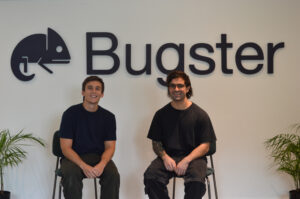
Por Victor Cortés
December 15, 2018
Contxto – Ah, the pitch! That one magical moment when founders feel like Steve Jobs presenting the new iPhone, and investors sit down with a cocky smirk and crossed fingers like Kevin O’Leary in Shark Tank.
The startup pitch is something you have to experience first hand to really understand its best practices, and to empirically test what works and what doesn’t. However, there are a few ways in which you can prepare yourself before the pitch, and err the least.
We reached to the top Venture Capitalists in Guadalajara to ask them what they think the best practices are when it comes to pitching an investor. So stick around and prepare your notepad!
Although every investor is different, there are some things most of them would agree on. If there’s one thing every VC we contacted coincided with, was the following:
Be extremely clear and straightforward about your product, your business model and your monetization strategy. Do not rely on technicalities or fancy words to look smart. It usually ends up in confusion and miscommunication issues with your potential investors.
Now, Alejandro González, the Fund Manager of Redwood Ventures – Guadalajara’s native VC fund – gave us the following advice for you guys founding out there!
Focus on your product’s/service’s competitive advantages. What makes you unique? How are you showcasing your value proposition? Picture this, the average VC firm reviews 1,200 startup pitches before committing to 10 investments. So, you’ll have to stand out above 99.2% of all other companies. Ask any VC and they’re probably targeting a 10x return in early-stage companies. The rate of failure in startups is so high that they have to look for a home run in every single investment.
As the infamous VC, Marc Andreessen once said: “The Venture Capital business is a 100% game of outliers – it’s the extreme exceptions”.
So, make sure you do have a unique proposition, and equally important, make sure you actually communicate it clearly! It’s amazing how many great startups get rejected because they weren’t able to display their actual value.
Remember folks, it doesn’t matter if the guacamole tastes great, most people would pass on it if it looks ugly.

Show confidence and passion when pitching your company. Nothing kills an investor’s appetite more than a bored/ing entrepreneur. Now, don’t get me wrong, you don’t have to drink five Red Bull cans before pitching, but you do have to display passion and excitement. Also, you don’t have to imitate Tony Stark to look cocky, but make sure to practice your pitch enough that you seem confident and sure about what you’re saying.
Sometimes founders underestimate the importance of attitude, personality and charisma. “If it’s a great product, it sells itself”, founders usually say, nonetheless most VC’s think in terms of team before product.
Ana Victoria García, Mexico’s Shark Tank investor summarizes both points spot on! She said she invests in people with vision and passion, “¡pero que se note!” (as long as they show it!).
We also talked to Javier Sánchez and Alejandro Díaz, Angel Ventures’ Regional Director and Investment Analyst, respectively. They also provided great advice to founders looking for investment:
Yes, planning is guessing. But also, planning is putting in the work to set the desired milestones. Although a plan would most of the times remain under/overachieved, the fact that you’re putting in the work and you’re considering many factors that could drive the future growth of your company, lets the investor know that you’re not just talk but you can also walk (what?).
Anyways, having a sales and marketing strategy to back up your claims is crucial. Investors already know that those numbers, most likely, won’t become true, in the sense that you could either outperform or underperform them. However, if you just come up with claims and growth projections without any tangible strategy to follow, you’re going to sound not just crazy but naïve, too.
Be concise. What are you planning to achieve? When are you going to achieve those metrics? And what resources do you need to make that happen?
How much do you need and in exchange of what? Simple as that.
What’s our burn rate and runway? What are you going to use those resources for? When are you going to run out of funds, and need to raise another round?
Talk clearly about your round’s characteristics. Founder’s should always be aware of their company’s status. Be it the amount being raised, the financial vehicle, the valuation, etc. Not having a valuation in mind isn’t good, either. It slows the process down and it helps no party involved. Check out Dalus Capital’s tips on valuation!
Have coherent, realistic numbers according your startup stage. What happens if you’re overly optimistic without any data or previous track record to back those numbers up, is that you might fall short on them, and future fundraising efforts would result in a down round. Here’s a brief guide to down rounds and why they’re no good, amigo!
Modeling is helpful, especially if you’re analyzing scenario possibilities and you’re considering most drivers and obstacles that could affect the end result. Also, look for similar companies or comparables that could support your intentions. Success cases are always helpful and easy to visualize.
Ultimately, look for slightly optimistic goals that fall in the “visionary” range of adjectives and not in the “hallucinating” category.
I once read a book that summarized perfectly what is actually needed in the pitch deck, and what is just noise. Guy Kawasaki’s The Art of Start 2.0 suggests every pitch deck should follow the 10/20/30 rule.
10 Slides. 20 Minutes. 30 point sized font.
– Guy Kawasaki, Garage Technology Ventures
You don’t need anything else. At the end of the day the deck is just a supporting tool, not the persuasion strategy itself. Your oral pitch should be the main weapon!
Take for example, Airbnb’s first pitch deck below, they were doing it right!
[slideshare id=45768374&doc=airbnbfirstpitchdeck-150312141444-conversion-gate01]
Lastly, I would add something to the previous tips (and also to Airbnb’s presentation itself):
Focus on the team.
Sure, it sounds cliché, but really when there’s few data to back up all the numbers and the vision, most investors rely on a gut feeling of whether the team would be able to push through and achieve the impossible or not.
Most of the times the decision is made emotionally as they hear the founders pitch, and then they turn to numbers and metrics to prove whether it makes sense, logically speaking.
So here’s my own humble advice. Focus on being the best version of yourself. All the time. Do not focus on only improving your product, but improving yourself. Your personal brand has so much to say about your company, than you might think.
So they there are, some VC approved tips to nail your presentation next time you’re in front of investors.
Also, make sure to iron your shirt and brush your teeth.
– VC.

Por Stiven Cartagena
September 15, 2025
December 4, 2024
November 20, 2024